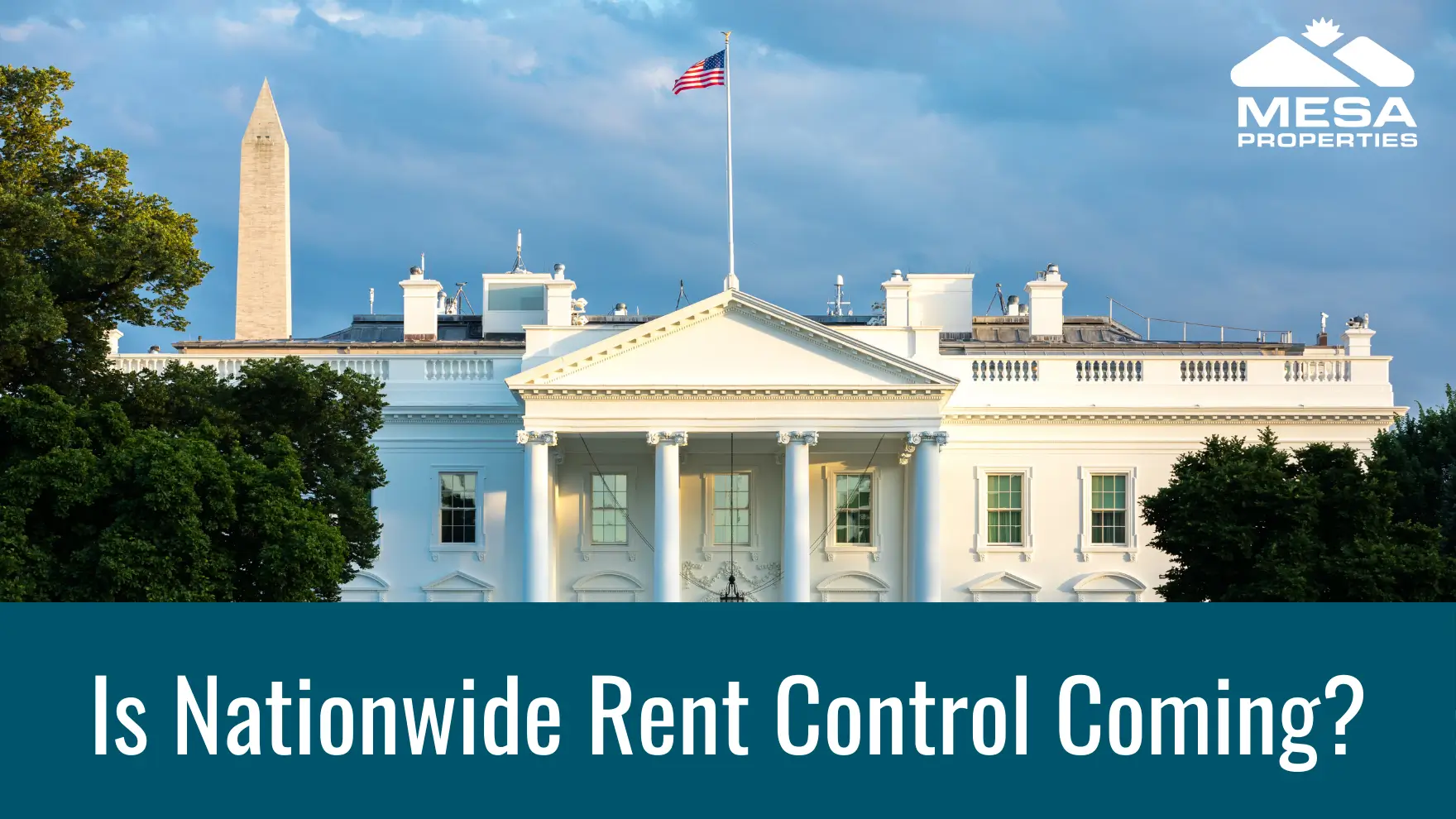We have all become accustomed to the topic of rent control here in California, specifically at the State and local level. After all, California passed AB 1482 which instituted state-wide rent control back in 2019.
More recently, the City of Pasadena passed rent control at the city level in the form of Measure H which you can read about on their website.
But it’s not nearly as common for the Federal Government to talk about rent control.
January was a big month for a Federal push towards rent control as 50 members of Congress signed a letter sent to President Biden urging him to do everything in his power to cap rent increases.
Subsequently, the White House issued a 19 page document titled “The White House Blueprint For a Renters Bill of Rights.” Nothing in this document creates any new policies, but it does point to several renter-friendly initiatives that the Federal government is currently undertaking and details a wishlist of renter protective actions that they would like to see implemented. “They” being the current administration occupying the White House.
How This Affects You
You may ask, if this isn’t law and just the administration’s opinion, why should I care about it?
As a rental property owner and landlord, it’s important to pay attention to the messaging coming from the powers that be. Usually this messaging is rather vague and generic, so when you get something as specific and explicit as the Blueprint For a Renters Bill of Rights, it’s wise to pay attention and start preparing for what the future will hold.
Speaking of the future, I’ve begun writing more about what I think things will look like in the future for California landlords because the best thing you can do as a landlord is to prepare and make sure you are in the best position possible when the inevitable finally manifests itself.
Renters are quickly becoming a majority population in our State and the legislators and politicians know that. As long as the number of people renting in the State outnumbers those that own their homes, more renter friendly laws and rules will continue to come out.
But back to the topic at hand. I always talk about California specifically but a nationwide adoption of rent control would be an interesting (and logistically nightmarish) policy. The proposed Bill of Rights outlines five principles for what they think is fair for renters. I won’t get into all of them but there are some things in the document that are worth diving a little deeper on.
Flawed Data
At the beginning of the document, the writers site a Zillow study that claims that between February 2021 and February 2022, average rents increased by 17.2%.
That figure would lead you to believe that the average renter got a 17.2% increase in rent in that time period. Ask any renter you know. That just isn’t true.
Average asking rent on new rentals increased that much, but not on existing leases. And that increase is as much a supply and demand coupled with inflation created problem as anything else. Renters who moved during that time period would have felt the effects, but those that stayed put certainly did not.
In fact from our own data, most rent increases in the last 2 years haven’t even kept up with inflation, much less exceeded it.
Cheaper Rent and Reduced Application Requirements
They also state that renters should pay no more than 30% of household income on housing costs without specifying how that is possible. Does that mean landlords should reduce the rent so that this math works? Or should the government step in with housing vouchers to fill the gap?
More housing vouchers means more taxpayer money which means more printed money which leads to more inflation which leads to higher rent. It just doesn’t make sense to say that it should be a requirement that no one pay more than 30% of their income on housing without specifying how that is possible.
We can all agree that paying more than 30% of household income on housing is financially burdensome. But if someone wants to work a minimum wage job, does that mean they should be able to rent whatever home they want and not pay more than 30% of their income for it? The document does not specify.
It also says that the application process, including the collection of documents for income verification, should be minimally burdensome for the applicant.
Renters often tell us that our application process is burdensome and that we ask for a lot of documentation, but the reason is that we see fraud on at least 15% of our applications. We ask for a lot of documentation so we can be absolutely sure that the applicants are real because at least 15% of them are not.
Reducing application requirements would lead to a significantly higher eviction rate, leading to significantly higher costs for landlords, leading to higher rent. So many of these proposed policies will have the exact opposite effect of what they intend to accomplish.
Ironic Data
The document goes on to state that “limited housing supply has created more competition for fewer available units, which gives owners even more leverage in deciding to whom to rent to, what lease terms to offer, and whether and how much to raise rents. At the same time, the housing stock in America is aging, and more rental housing is facing obsolescence or poor housing conditions.”
The irony here is that the housing supply shortage, at least in California, exists in large part because of the government that has made it so expensive and difficult to build new housing.
Instead of removing as much red tape as possible, specifically around the environmental considerations of new housing, the government wants to force rent control regardless of the actual cost to build new housing. Which, predictably, will have the exact opposite effect of what they want. Builders will simply stop building and go somewhere that they can actually make a profit by building new rental housing.
Also, rental property owners aren’t just trying to “pick the best applicant.” Many have rental requirements that are the result of hard learned lessons. Ask any landlord who has gone through a nasty eviction and they will tell you that they are much more careful when screening tenants to ensure they are well qualified to rent their homes so they can avoid losing thousands of dollars in eviction costs in the future.
The Weaponization of Government Agencies Against Landlords
In a portion of the document that talks about things that are actually occurring, the document discusses steps the FTC is taking to go after landlords. “The Federal Trade Commission (FTC), an independent agency, has announced it will explore ways to expand the use of it’s authority under the FTC Act to take action against acts and practices that unfairly prevent consumers from obtaining and retaining housing.”
The scary thing is that it isn’t very clear what that means. If a landlord’s rental criteria is deemed to be “unfair,” ie too high of a credit score required to rent, does this mean the FTC could come after them?
It goes on to say that credit reports have the potential to be inaccurate and can lead to housing discrimination. There continues to be messaging hinting that a future where a landlord is prohibited from, or at least severely restricted in, using credit reports for the screening of any applicant.
Even Longer Eviction Timelines
One of the final things I will bring to your attention is their desire to have 30 days notice of eviction the standard as well as taxpayer funded legal counsel during the process.
This section also deserves an irony heading because they are simultaneously wanting it to become much easier for renters to be able to rent homes in the form of reduced application requirements as they are making it take longer and become much harder to evict a tenant for non-payment of rent.
The harder it is to evict a non-paying tenant and the longer it takes, the stricter landlords will make their application requirements. That’s just common sense good business practice.
If you can evict a tenant quickly who stops paying rent, you can be a lot more lenient on who you let rent your property because the risk is significantly lower.
The harder and longer the eviction process is, the riskier it is to rent out your home at all and therefore the stricter your requirements should be. The White House proposes you drop all requirements while they make it as difficult as possible for you to regain possession of your property in the event your tenant stops paying rent. This is one of the most illogical portions of the document.
What’s a Landlord to do?
It’s easy to look at a document like this and freak out and decide to get out of the landlord game.
I still don’t think that is the right call. Just about everything discussed here is simply a wishlist. With the general election of 2024 starting to pick up, it’s unlikely anything significant will happen between now and the next cycle. If the same administration is in the White House next November, that could change.
Real Estate continues to be one of the best hedges against inflation for your hard earned money. Even if you are under rent control in California, increases are currently capped at 10% which is typically more than enough. Unless you are in LA or San Francisco. It’s a different story in those markets.
As we always say, prepare as best as you can. Keep your rent close to market value. Make sure you have a very strong lease. Have strong application requirements and a solid screening process that enables you to catch the fraud. Enforce your lease. Stay compliant with Fair Housing laws. Maintain your property in habitable condition and do the right thing by your tenants.
Or, call us and have us do it all for you. We’ll worry about all these details and you can do, well, anything else.



